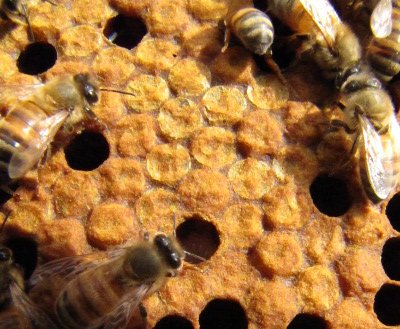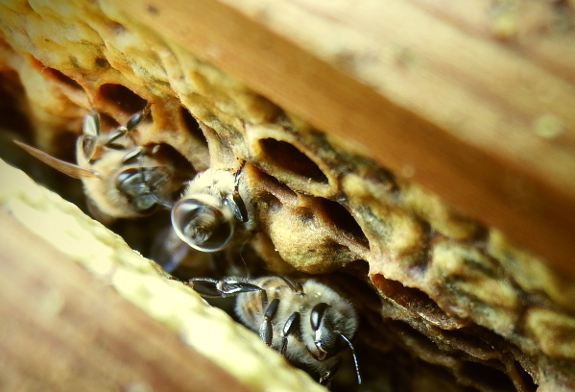
Backyard bees in the larger landscape
 "I’m a longtime reader of your blog and
thought you might want to respond to this
article based on its conclusions that beekeepers that take
alternative approaches to hive maintenance/infection might be
inadvertently harming the larger local bee population by relying on
potentially ineffective virus and mite controls, or worse no controls
whatsoever.
"I’m a longtime reader of your blog and
thought you might want to respond to this
article based on its conclusions that beekeepers that take
alternative approaches to hive maintenance/infection might be
inadvertently harming the larger local bee population by relying on
potentially ineffective virus and mite controls, or worse no controls
whatsoever."Don’t have bees myself, but note that the implication of the study itself may call into question the viability/utility of hobby beekeeping given the potentially negative impact on big agriculture and associated food security resources.
"Anyway, I found it pretty thought-provoking and an opportunity to think critically about the effect homesteading and personalized agriculture, both positive and negative, has on society at large. Perhaps you will as well."
--- David in Anchorage, AK
This is definitely an interesting article for backyard beekeepers and I think the author is on the right track in certain ways. On the other hand, I just wish the article had hit the other side of the coin --- that there are ways to deal with mites beyond chemicals.
 We've had great luck over the
last couple of years using foundationless frames (which leave less room in
brood comb for mites) combined with bees
bred to resist varroa mites (probably hygienic strains,
meaning they groom the mites off). Using both of these techniques, our mite
counts in recent
years have been very low, proving that chemicals aren't the only
solution.
We've had great luck over the
last couple of years using foundationless frames (which leave less room in
brood comb for mites) combined with bees
bred to resist varroa mites (probably hygienic strains,
meaning they groom the mites off). Using both of these techniques, our mite
counts in recent
years have been very low, proving that chemicals aren't the only
solution.But, yes, just ignoring the problem and hoping it goes away is bad for not only your bees but also for those of your neighbors. And the same concept could easily be applied to other facets of homesteading as well. It's a fascinating thought problem to consider how our mini-farms fit into the wider landscape of both factory farming and the wider natural world. Thanks for sharing!
Want more in-depth information? Browse through our books.
Or explore more posts by date or by subject.
About us: Anna Hess and Mark Hamilton spent over a decade living self-sufficiently in the mountains of Virginia before moving north to start over from scratch in the foothills of Ohio. They've experimented with permaculture, no-till gardening, trailersteading, home-based microbusinesses and much more, writing about their adventures in both blogs and books.
Want to be notified when new comments are posted on this page? Click on the RSS button after you add a comment to subscribe to the comment feed, or simply check the box beside "email replies to me" while writing your comment.

Hi Anna and Mark,
I was going to read the article and then I noticed it was an npr article.
Needless fearmongering IMHO.
Glad I don't expose myself to their nonsense very often!
Regardless of source of info (NPR reporting isn't automatically evil or in error imho....) the jist of the article is right on target. I'm guilty, in fact.
Let me share that I've kept bees for the last 7 or 8 years. I have about 6 colonies right now. I want no more than 10. So I'm a small guy beekeeper the article references. I try to do the 'natural' thing and have not treated for varroa mites because I like to be organic and chem free. I thought my bees were somehow immune and special. Wrong! As the article points out - and any number of other references confirm - untreated colonies will dwindle and poop out after about 3 years sans treatment. My own experience confirms this in spades.
I did a lot of reading and research this past winter. It turns out that thyme oil fumed into hives using a simple fogger and mineral oil can be pretty effective. Wintergreen oil also works in the mineral oil carrier. USDA Dr. Carlos Rodrigues developed this concept. Here is a link to a SARE study: http://mysare.sare.org/sare_project/fne08-641/?page=annual&y=2009&view=print
I have fogged at least once every 21 days this season since April. My hives are thriving! Although the study is inconclusive as to whether the thymol fogging actually kills the mites, it absolutely shows increased honey productionm which to me means the bees are healthier. My observation is that the fogging induces the bees to groom and physically remove the mites. During honey super time, I have fogged only with mineral oil. This simple cheap innocuous treatment will continue to be part of my beekeeping.
Last year, USDA/EPA also legalized using oxalic acid vaporization to treat mites. This is 98%+ effective at killing mites. I will be vaporizing this fall. I'm using a homemade vaporizer because I like to make things and I'm cheap. We can all do this, and we will all benefit from the increased health of our bees.
The article leaves out some important information.
One is that commercial beekeepers who maintain thousands of hives are also suffering large losses. During the time that Colony Collapse Disorder was most virulent, some outfits running tens of thousands of hives were losing 80 percent of their colonies. They are still losing colonies in percentages almost as high as hobby beekeepers, despite their use of miticides, and the numbers of colonies involved are vastly higher.
Another thing to bear in mind is that there are many wild colonies to be factored in to this question. Both commercial beekeepers and hobbyists lose swarms in large numbers every year, and if hobby beekeepers are to be considered sinks of disease and parasites, then we must also accept that wild colonies are also problematic. Again, the numbers of escaped swarms are vastly higher for large commercial operations.
The article fails to mention that mites and diseases are spread most readily by large commercial operations that truck hundreds of thousand of hives around the country for pollination purposes, and that this style of beekeeping puts colonies under enormous stress-- which leads to weak colonies vulnerable to infection and collapse.
But most importantly, the use of miticides to control varroa is a doomed strategy. Varroa mites have a much higher rate of reproduction than bees. Until we get bees that can resist mites on their own, we are on a treadmill that is taking us nowhere. Mites rapidly become resistant to the miticide du jour, and new poisons must be developed to maintain the operations of large commercial beekeepers. This neverending cycle will not end well; it never does.
The only realistic hope for the continuation of beekeeping as a human activity lies in the development of bees that can coexist with parasites like varroa. That is never going to happen if bees are continually drenched in miticides, allowing colonies that would otherwise die to go on spreading their vulnerable genetics.
It is possible to develop resistant bees. It has been done by breeders such as BeeWeaver. They did it by doing exactly what establishment academics like Spivak warn us against doing-- letting the bees evolve and self-select for resistance.
To make a long story a little shorter, the article is nonsense.
The study they link to, and how the article was written, was very inconclusive. They're talking about mites in the article, but in the survey, the loses were taken over winter. So we have a climate variable at play, which was not even mentioned in the article.
I suspect it is climate which is the bigger foe here, and the mites are just the parasite being blamed, for exploiting the niche, climate change has given them, over the bees. And if this article is anything to go by, it will be completely missed by the masses too.